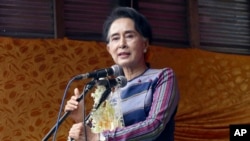Myanmar opposition leader Aung San Suu Kyi is calling for vigorous international monitoring of her country's November general elections that will be the first since decades of military rule ended there in 2011.
In a video posted Tuesday on the Facebook page of her National League for Democracy (NLD) party, the longtime democracy advocate said the vote will be "the first time in decades our people will have a chance of bringing about real change."
"This is a chance that we cannot afford to let slip," Suu Kyi said in the English-language video. "We hope that the whole world understands how important it is for us to have free and fair elections and to make sure that the results of such an election are respected by all concerned.
'Please help us'
"Please help us by observing what happens, before the elections, during the elections, and crucially after the elections. This is the best contribution you can make to peace and progress in this country, by ensuring that our people feel their will has been respected," she added.
Tuesday marks the official start of the campaign period for the November 8 vote, which will seat a parliament that will then select a president.
The NLD is expected to make heavy gains in the election.
President Thein Sein, the ex-army general who has enacted a series of reforms, is not running for re-election as a parliamentary candidate but could still be a nominee for president.
Thein Sein last month oversaw the dramatic, middle-of-the-night overthrow of parliament speaker Shwe Mann as chairman of the country's ruling Union Solidarity and Development Party (USDP).
Shwe Mann was seen as a growing ally of Suu Kyi and had pushed the USDP to enact constitutional reforms that would limit the military's political power.
Military guarantee
Under the constitution, the military is guaranteed 25 percent of seats in parliament, enough to block constitutional reforms it opposes.
Suu Kyi has criticized Shwe Mann's purge, saying, "This is not what you expect from a working democracy."
Suu Kyi, who enjoys huge public support, is barred from running for president because of a clause in the constitution that excludes people with foreign spouses or foreign children from the presidency.
The clause is widely seen as custom-made for Suu Kyi, who is the widow of a British academic and has two sons with British nationality. She is seeking re-election to parliament.
More than 90 political parties will take part in the parliamentary elections, which are being closely watched as the next step toward democracy in a country that was run by a repressive military junta for nearly half a century.
Election
The polls will be the first since a nominally civilian government was installed in 2011. But with the military still firmly in control of the process, there is widespread speculation over whether the election will be free and fair.
The polls will also be the first time Suu Kyi's NLD party has contested a general election in 25 years.
The last time the NLD took part in a national election was in 1990, when it won by a landslide.
But the result was ignored by the military, which kept Suu Kyi locked away under house arrest for 15 years without phone lines or Internet, and blocked virtually all contact with the outside world.
The party boycotted the next nationwide election in 2010 because Suu Kyi, a Nobel Peace Prize winner, was still under house arrest and barred from taking part.
The 2010 polls were condemned by international observers for widespread irregularities. It was in 2010 that Suu Kyi commented through her lawyer that she wished to “sign up on Twitter” once she was released to “get in touch with the younger generation inside and outside the country.”
A week after the 2010 election, Suu Kyi was released from house arrest.
Her party took part in 2012 by-elections, winning 43 of the 44 seats it contested, including Suu Kyi's first elected post as a member of parliament.
Some material for this report came from AP.





